简爱英文简介
简爱英文简介

The wedding ceremony is interrupted by a lawyer, who declares that Mr. Rochester is already married. His mad wife Bertha Mason, a Creole from Jamaica whom his family forced him to marry, resides in the attic of Thornfield Hall, and her presence explains all sorts of mysterious events that have taken place during Jane's stay in Thornfield. Mr. Rochester offers to take her abroad to live with him, but Jane is not willing to sacrifice her morals or self-respect for earthly pleasures, let alone accept the status of mistress, even though Rochester insists Jane will break his heart if she refuses him. Torn between her love for Rochester and her own integrity and religion, Jane flees Thornfield in the middle of the night, with very little money and nowhere to go.
简爱英文简介.txt心态决定状态,心胸决定格局,眼界决定境界。当你的眼泪忍不住要流出来的时候,睁大眼睛,千万别眨眼,你会看到世界由清晰到模糊的全过程。这是简爱的简介,供你参考,尽量用自己的话改一改。
《简爱》-英文简介

• While Jane hesitated whether left England as a missionary’s(her cousin) wife or not , Rochester’s manor was destroyed by his crazy wife, he also injured (blinding).Having the mind induction,Jane back to the manor, finally they lived happily ever after.
2021/10/10
7
Thank you
2021/10/10
8
JANEEYRE
2021/10/101Biblioteka 2021/10/102
The author: Charlotte Bronte
夏洛蒂.勃朗特
Charlotte Bronte British woman novelist, is active in the British literary Bronte sisters. She is the oldest of three sisters.
• 正当简犹豫是否作为传教士的(他的表妹)的妻子离开英 国时,罗切斯特庄园被他的疯狂妻子摧毁,他也受伤(盲 的),有心灵感应似的,简回到了庄园,最后他们过着幸 福的生活。
2021/10/10
6
Sentence Reviews
I miss him ,love him, hazing, indelible, is not the sun, dispel the sand storms blow can b伍ui德ld 学a s校tatue. 我思念他,挚爱他,刻骨铭心,不可
janeeyre人物简介英语

Word 文档1 / 1janeeyre 人物简介英语《简爱》是部脍炙人口的作品,那么你了解里面人物的独特吗?下面由我为你提供的jane eyre 人物简介,希望大家宠爱。
jane eyre 人物简介(一)Jane Eyre The orphaned protagonist of the story. When the novel begins, she is an isolated, powerless ten -year -old living with an aunt and cousins who dislike her. As the novel progresses, she grows in strength. She distinguishes herself at Lowood School because of her hard work and strong intellectual abilities. As a governess at Thornfield, she learns of the pleasures and pains of love through her relationship with Edward Rochester. After being deceived by him, she goes to Marsh End, where she regains her spiritual focus and discovers her own strength when she rejects St. John Rivers marriage proposal. By novels end she has become a powerful, independent woman, blissfully married to the man she loves, Rochester. jane eyre 人物简介(二)Edward Fairfax Rochester Janes lover; a dark, passionate, brooding man. A traditional romantic hero, Rochester has lived a troubled wife. Married to an insane Creole woman, Bertha Mason, Rochester sought solace for several years in the arms of mistresses. Finally, he seeks to purify his life and wants Jane Eyre, the innocent governess he has hired to teach his foster daughter, Adle Varens, to become his wife. The wedding falls through when she learns of the existence of his wife. As penance for his transgressions, he is punished by the loss of an eye and a hand when Bertha sets fire to Thornfield. He finally gains happiness at the novels end when he isreunited with Jane. jane eyre 人物简介(三)Sarah Reed Janes unpleasant aunt, who raises her until she is ten years old. Despite Janes attempts at reconciliation before her aunts death, her aunt refuses to relent. She dies unloved by her children and unrepentant of her mistreatment of Jane.John Reed Janes nasty and spoiled cousin, responsible for Janes banishment to the red -room. Addicted to drinking and gambling, John supposedly commits suicide at the age of twenty -three when his mother is no longer willing or able to pay his debts.。
简爱英文名著
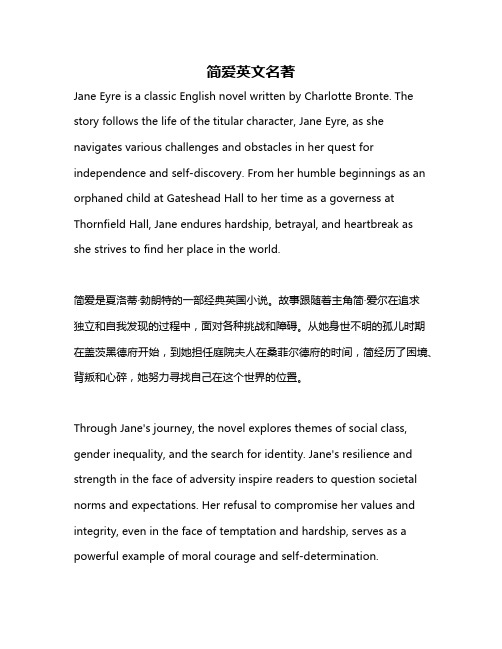
简爱英文名著Jane Eyre is a classic English novel written by Charlotte Bronte. The story follows the life of the titular character, Jane Eyre, as she navigates various challenges and obstacles in her quest for independence and self-discovery. From her humble beginnings as an orphaned child at Gateshead Hall to her time as a governess at Thornfield Hall, Jane endures hardship, betrayal, and heartbreak as she strives to find her place in the world.简爱是夏洛蒂·勃朗特的一部经典英国小说。
故事跟随着主角简·爱尔在追求独立和自我发现的过程中,面对各种挑战和障碍。
从她身世不明的孤儿时期在盖茨黑德府开始,到她担任庭院夫人在桑菲尔德府的时间,简经历了困境、背叛和心碎,她努力寻找自己在这个世界的位置。
Through Jane's journey, the novel explores themes of social class, gender inequality, and the search for identity. Jane's resilience and strength in the face of adversity inspire readers to question societal norms and expectations. Her refusal to compromise her values and integrity, even in the face of temptation and hardship, serves as a powerful example of moral courage and self-determination.透过简的旅程,小说探讨了社会阶层、性别不平等和身份寻找等主题。
(完整版)简爱英文版介绍

Bessie Lee
• The maid at Gateshead who sometimes consoled Jane by telling her entertaining stories and singing her songs. Bessie visited Jane at Lowood, impressed by Jane’s intellectual attainments and ladylike behavior.
Eliza Reed
❖ Another one of Jane’s spoiled cousins, Eliza was jealous of the beauty of her sister— Georgiana.She showed no sympathy for her dying mother and decided to break off all contact with Georgiana after their mother’s death. Usefulness is her mantra.颂歌
▪ Born in Yorkshire in northern England ,she had four sisters and a brother. Her sisters Anne and Emily , are also well-known writers. So in the history of English literature, people often call they the "three Bronte sisters."
Sarah Reed
▪ Jane’s unpleasant aunt, who raised her until she was ten years old.She smothered her children with too much love,which made they not only selfish but ugly.And no matter what Jane had done,she always abused Jane without any reason.In a word,she didn't care about Jane.
《简爱》英文介绍【精品】

young age.
PLOT OF JANE EYRE
presents: Jane Eyre: A Plot Summary /watch?v=2wavPu4r5TI
MAJOR THEMES &CONFLICTS
Critics consider the text to be ahead of its time because of the
characterization of the female protagonist, Jane.
SYNTHESIS OF CRITICISM
Kirkus Review, “Jane: A Modern Romantic Retelling of Jane Eyre.” Review published Sept. 15, 2010. Viewed Feb. 12. 2013. Web.
Rochester locks her in the attic of his house. She repeatedly breaks out and tries to kill
Jane and Rochester. Eventually kills herself by setting fire to Thornfield Manor. Mrs. Alice Fairfax: Housekeeper of Thornfield Manor. Elderly widow. She keeps an eye on both Jane and Mr. Rochester.
CAST OF CHARACTERS
Adèle Varens: Daughter of Rochester’s French mistress. Rochester takes her in as his ward when her mother dies. Jane becomes her governess. Very excitable.
Jane Eyre 简爱中英文双语介绍
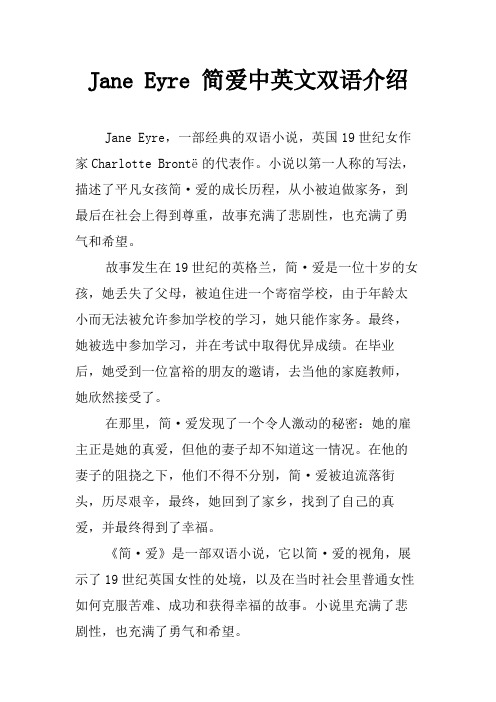
Jane Eyre 简爱中英文双语介绍Jane Eyre,一部经典的双语小说,英国19世纪女作家Charlotte Brontë的代表作。
小说以第一人称的写法,描述了平凡女孩简·爱的成长历程,从小被迫做家务,到最后在社会上得到尊重,故事充满了悲剧性,也充满了勇气和希望。
故事发生在19世纪的英格兰,简·爱是一位十岁的女孩,她丢失了父母,被迫住进一个寄宿学校,由于年龄太小而无法被允许参加学校的学习,她只能作家务。
最终,她被选中参加学习,并在考试中取得优异成绩。
在毕业后,她受到一位富裕的朋友的邀请,去当他的家庭教师,她欣然接受了。
在那里,简·爱发现了一个令人激动的秘密:她的雇主正是她的真爱,但他的妻子却不知道这一情况。
在他的妻子的阻挠之下,他们不得不分别,简·爱被迫流落街头,历尽艰辛,最终,她回到了家乡,找到了自己的真爱,并最终得到了幸福。
《简·爱》是一部双语小说,它以简·爱的视角,展示了19世纪英国女性的处境,以及在当时社会里普通女性如何克服苦难、成功和获得幸福的故事。
小说里充满了悲剧性,也充满了勇气和希望。
Jane Eyre is a classic bilingual novel by English female writer Charlotte Brontë in the 19th century. The novel is written in first-person narrative, depicting the growing journey ofordinary girl Jane Eyre, from being forced to do housework to finally getting respect in society. The story is full of tragedy, but also courage and hope.The story takes place in England in the 19th century. Jane Eyre was a 10-year-old girl who had lost her parents and was forced to stay in a boarding school. Because she was too young to be allowed to study in the school, she could only do housework. Finally, she was chosen to attend classes and achieved excellent results in the exam. After graduation, she was invited by a wealthy friend to be his family teacher, and she acceptedit happily.There, Jane Eyre discovered an exciting secret: her employer was her true love, but his wife didn't know about it. Faced with his wife's obstruction, they had to separate. Jane Eyre was forced towander the streets and endure hardships. Finally, she returned home and found her true love and eventually got happiness.Jane Eyre is a bilingual novel that shows the plight of women in 19th century England and how ordinary women overcame difficulties, succeeded, and gained happiness in the society at that time through Jane Eyre's perspective. The novel is full of tragedy, but also courage and hope.。
Jane Eyre 简爱中英文双语介绍

Jane Eyre《简爱》(Jane Eyre),是19世纪的英国文学名著,1847年出版,作者是英国的女作家夏洛蒂·勃朗特(Charlotte Brontë)。
故事中的女主角简爱是个孤女,从小被寄养在盖茨海德庄园舅妈里德太太家,笼罩在被舅母虐待的阴影下,十岁那年被送进了罗伍德孤儿院,院长是个自私残忍的人,经历了种种折磨,她的好友海伦死于肺病;但她靠着坚强的意志完成了学业,成为一名优秀的教师,在孤儿院当了两年教师,但她受不了那里的孤寂,于是受聘于桑费尔德庄园.庄园的主人罗彻斯特是个性格阴郁而又喜怒无常的人,他和简爱经常为某种思想辩论不休,但两人却逐渐漫生情愫.有一天里德太太派人来找简爱,说她病危,要见简爱一面。
见面时,里德太太给她一封信,这封信是三年前简爱的叔父寄来的,向她打听简爱的消息,并把自己的遗产交给简爱。
里德太太谎称简爱在孤儿院病死了,临终前里德太太终于良心发现把真相告诉简爱。
罗彻斯特向她求婚,简爱答应了,并高兴地准备婚礼,但是在婚礼上却发现罗彻斯特已经有合法妻子,而且他的妻子受过精神创伤,是一个精神病患者。
简爱伤心的离开了桑费尔德庄园.她花光了所有积蓄,沿途乞讨,最后晕倒在牧师圣约翰家门前,被圣约翰和他的两个妹妹救醒。
并且帮助她找到教师的工作。
后来圣约翰发现简爱是他的表妹,向她求婚,但简爱没答应。
简爱回到桑费尔德庄园时,整个庄园已是一片废墟.罗彻斯特为了救妻子,被烧瞎了双眼并失去了一只手,孤苦无依。
简爱跟罗终于结婚,生了一个男孩,而罗彻斯特的眼睛则回复到可以见到儿子。
Jane Eyre is a novel by English writer Charlotte Brontë. It was published in London, England,in 1847 by Smith,Elder &Co. with the title Jane Eyre。
The first American edition was released the following year by Harper &Brothers of New York. Writing for the Penguin edition, Stevie Davies describes it as “influential feminist text” because of its in-depth exploration of a strong female character’s feelings.Plot introductionJane Eyre is a first—person narrative of the title character。
简爱英文简介10篇
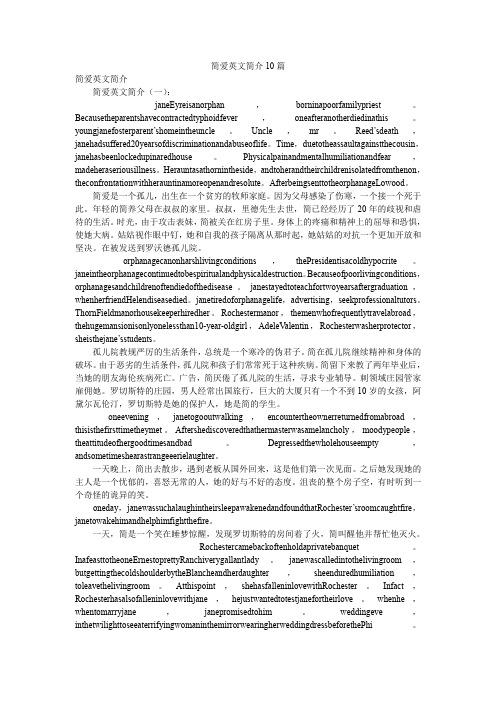
简爱英文简介10篇简爱英文简介简爱英文简介(一):janeEyreisanorphan,borninapoorfamilypriest。
Becausetheparentshavecontractedtyphoidfever,oneafteranotherdiedinathis。
youngjanefosterparent’shomeintheuncle。
Uncle,mr。
Reed’sdeath,janehadsuffered20yearsofdiscriminationandabuseoflife。
Time,duetotheassaultagainstthecousin,janehasbeenlockedupinaredhouse。
Physicalpainandmentalhumiliationandfear,madeheraseriousillness。
Herauntasathornintheside,andtoherandtheirchildrenisolatedfromthenon,theconfrontationwithherauntinamoreopenandresolute。
AfterbeingsenttotheorphanageLowood。
简爱是一个孤儿,出生在一个贫穷的牧师家庭。
因为父母感染了伤寒,一个接一个死于此。
年轻的简养父母在叔叔的家里。
叔叔,里德先生去世,简已经经历了20年的歧视和虐待的生活。
时光,由于攻击表妹,简被关在红房子里。
身体上的疼痛和精神上的屈辱和恐惧,使她大病。
姑姑视作眼中钉,她和自我的孩子隔离从那时起,她姑姑的对抗一个更加开放和坚决。
在被发送到罗沃德孤儿院。
orphanagecanonharshlivingconditions,thePresidentisacoldhypocrite。
janeintheorphanagecontinuedtobespiritualandphysicaldestruction。
英语作文向别人介绍简爱

英语作文向别人介绍简爱Title: Introducing Jane EyreJane Eyre is a powerful novel by Charlotte Brontë, telling the story of a young woman's struggle against adversity.Orphaned and abused as a child, Jane grows up resilient and determined. She finds a home at Lowood Orphanage but escapes its harsh realities to become a governess. Her life changes when she meets Mr. Rochester, an enigmatic master of Thornfield Hall. Despite their differences, they fall in love. But their relationship is tested by secrets and tragedies. Jane's unwavering sense of self-worth and dignity leads her to make difficult choices. This timeless tale of love, courage, and self-discovery inspires us all.翻译:标题:介绍简爱《简爱》是夏洛蒂·勃朗特创作的一部有力的小说,讲述了一个年轻女子与逆境抗争的故事。
简从小就成了孤儿,饱受虐待,但她长大后变得坚韧不拔,意志坚定。
她在罗沃德孤儿院找到了一个家,但逃离了那里的残酷现实,成为了一名家庭教师。
她的生活在她遇到桑菲尔德庄园的神秘主人罗切斯特先生时发生了改变。
Jane Eyre 简爱中英文双语介绍
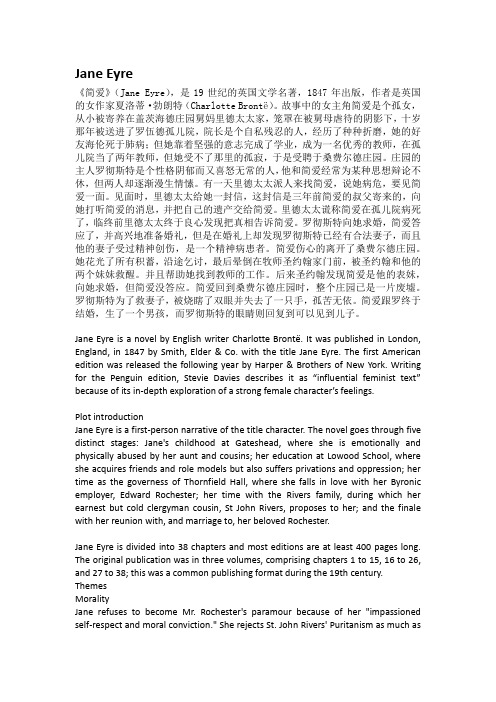
Jane Eyre《简爱》(Jane Eyre),是19世纪的英国文学名著,1847年出版,作者是英国的女作家夏洛蒂·勃朗特(Charlotte Brontë)。
故事中的女主角简爱是个孤女,从小被寄养在盖茨海德庄园舅妈里德太太家,笼罩在被舅母虐待的阴影下,十岁那年被送进了罗伍德孤儿院,院长是个自私残忍的人,经历了种种折磨,她的好友海伦死于肺病;但她靠着坚强的意志完成了学业,成为一名优秀的教师,在孤儿院当了两年教师,但她受不了那里的孤寂,于是受聘于桑费尔德庄园。
庄园的主人罗彻斯特是个性格阴郁而又喜怒无常的人,他和简爱经常为某种思想辩论不休,但两人却逐渐漫生情愫。
有一天里德太太派人来找简爱,说她病危,要见简爱一面。
见面时,里德太太给她一封信,这封信是三年前简爱的叔父寄来的,向她打听简爱的消息,并把自己的遗产交给简爱。
里德太太谎称简爱在孤儿院病死了,临终前里德太太终于良心发现把真相告诉简爱。
罗彻斯特向她求婚,简爱答应了,并高兴地准备婚礼,但是在婚礼上却发现罗彻斯特已经有合法妻子,而且他的妻子受过精神创伤,是一个精神病患者。
简爱伤心的离开了桑费尔德庄园。
她花光了所有积蓄,沿途乞讨,最后晕倒在牧师圣约翰家门前,被圣约翰和他的两个妹妹救醒。
并且帮助她找到教师的工作。
后来圣约翰发现简爱是他的表妹,向她求婚,但简爱没答应。
简爱回到桑费尔德庄园时,整个庄园已是一片废墟。
罗彻斯特为了救妻子,被烧瞎了双眼并失去了一只手,孤苦无依。
简爱跟罗终于结婚,生了一个男孩,而罗彻斯特的眼睛则回复到可以见到儿子。
Jane Eyre is a novel by English writer Charlotte Brontë. It was published in London, England, in 1847 by Smith, Elder & Co. with the title Jane Eyre. The first American edition was released the following year by Harper & Brothers of New York. Writing for the Penguin edition, Stevie Davies describes it as “influential feminist text” because of its in-depth exploration of a strong female character’s feelings.Plot introductionJane Eyre is a first-person narrative of the title character. The novel goes through five distinct stages: Jane's childhood at Gateshead, where she is emotionally and physically abused by her aunt and cousins; her education at Lowood School, where she acquires friends and role models but also suffers privations and oppression; her time as the governess of Thornfield Hall, where she falls in love with her Byronic employer, Edward Rochester; her time with the Rivers family, during which her earnest but cold clergyman cousin, St John Rivers, proposes to her; and the finale with her reunion with, and marriage to, her beloved Rochester.Jane Eyre is divided into 38 chapters and most editions are at least 400 pages long. The original publication was in three volumes, comprising chapters 1 to 15, 16 to 26, and 27 to 38; this was a common publishing format during the 19th century. ThemesMoralityJane refuses to become Mr. Rochester's paramour because of her "impassioned self-respect and moral conviction." She rejects St. John Rivers' Puritanism as much asthe libertine aspects of Mr. Rochester's character. Instead, she works out a morality expressed in love, independence, and forgiveness. Jane does not want to be seen as an outcast to society by being a mistress to Rochester.FeminismThe role and standing of women in the Victorian era is considered by Brontë in Jane Eyre, specifically in regard to Jane's independence and ability to make decisions for herself. As a young woman, small and of relatively low social standing, Jane encounters men during her journey, of good, bad, and morally debatable character. However, many of them, no matter their ultimate intentions, attempt to establish some form of power and control over Jane. One example can be seen in Mr. Rochester, a man who ardently loves Jane, but who frequently commands and orders Jane about. As a self-assured and established man, and her employer, Mr. Rochester naturally assumes the position of the master in their relationship. He sometimes demands rather than questioning Jane, tries to manipulate and assess her feelings towards him, and enjoys propping up Jane through excessive gifts and luxuries that only he would have been able to provide. Jane, however, believes in the importance of women's independence, and strives to maintain a position in life devoid of any debts to others. Her initial lack of money and social status unnerves her, as she realizes that without the means to be an independent woman, she is bound to either struggle through life trying to make a living or marry and become dependent on a man. Even after Jane agrees to marry Mr. Rochester, and is swept up in the passion of the moment, the feminist elements of her personality still show through. She is uncomfortable with the showering of lavish gifts, as she resents that they will make her further reliant on and in debt to Mr. Rochester, and thus tries to resist them. Furthermore, Jane asserts that even after she is married to Mr. Rochester, she will continue to be Adèle's governess and earn her keep. This plan, which was entirely radical and unheard of for the time, further illustrates Jane's drive to remain a somewhat independent woman. While the significant men present in Jane's life throughout the novel all try to, in some form or another, establish themselves as dominant over Jane, she in most cases remains resistant at least to a certain degree, refusing to submit fully or lose all of her independence.。
简爱英文简介及翻译

简爱英文简介及翻译简爱英文简介及翻译简爱是一个孤儿,出生在一个贫穷的牧师家庭。
因为父母感染了伤寒,一个接一个死于此。
年轻的简养父母在叔叔的家里。
下面是店铺为大家带来简爱英文简介及翻译,欢迎大家参考。
Jane love parents sojourn in uncle's early death,died uncle,aunt took her to the orphanage,and came to Saan Field,when the hero luoche Mr.Secretary family teacher,Mr Rochester temper strange,after several contacts,Jane fell in love with him.In their wedding,Mason broke into the old castle attic hut the insane woman is the wife of Mr.Roache division,Jane love as his mistress not leave Saan Field.T o a remote place with the help of the priest found a village teacher's occupation.The proposed marriage to Jane love in the minister,she thought of luoche Mr.secretary.When back to Saan Field castle ruins.Jane loves to Mr Rochester live Ferndean,threw herself into the arms of luoche Mr.secretary.Jane love is hate graduated from school,in Mr.Rochester's manor to find a job as a tutor,in charge of education Mr.Rochester's daughter,two people in the process to wipe out the spark of love,but when two people get married the day before a lady,accident that Mr.Rochester did not die,but was mad and positive shut in the manor,and Jane love to leave the estate,and met his cousin cousin,while Jane love hesitant and cousin together to leave England as a missionary's wife,Rochester manor as mad wife arson be destroyed on one day,he himself also injured blinding,have the mind induction Jane love back to the manor,two people and live happily ever after together.简爱父母早亡寄居在舅舅家,舅舅病逝后,舅母把她送进孤儿院,来到桑恩费尔德,当男主人公罗彻司特先生家的家庭教师,罗彻先生脾气古怪,经过几次接触,简爱爱上了他。
小说《简爱》的英文简介

《简爱》是英国小说阿基夏洛蒂•勃朗特的作品,刻画了一个女性的成长历程。
就让我们一起重温这部经典,来看看《简爱》的英文简介。
Jane Eyre is a novel by English writer Charlotte Brontë. It was published in London, England, in 1847 with the title Jane Eyre. An Autobiography under the pen name "Currer Bell". The Penguin edition describes it as an "influential feminist text" because of its in-depth exploration of a strong female character's feelings.《简爱》是英国小说作家夏洛蒂•勃朗特的作品,1847年在英国伦敦出版,书名定为自传《简爱》,以笔名“库瑞尔•贝尔”署名。
Penguin出版社的版次将小说誉为“具有影响力的女权主义文本”,因为小说深入探索了女主角的强烈情感。
The novel merges elements of three distinct genres. It has the form of a Bildungsroman, a story about a child's maturation, focusing on the emotions and experiences that accompany growth to adulthood. The novel also contains much social criticism, with a strong sense of morality at its core, and finally has the brooding and moody quality and Byronic character typical of Gothic fiction. 小说融合了三截然不同的写作风格。
英语作文介绍《简爱》
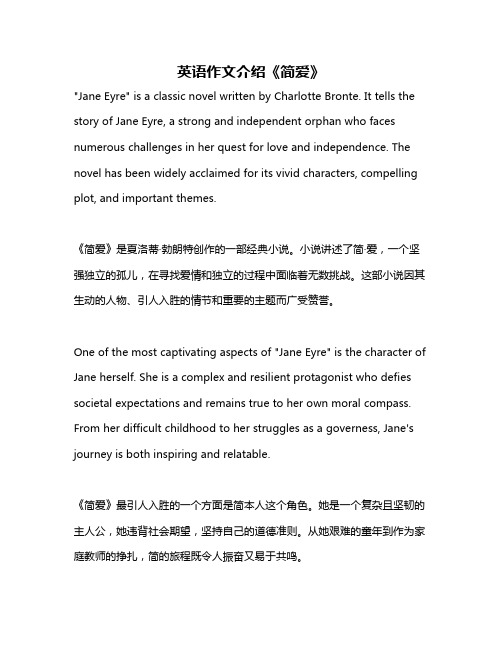
英语作文介绍《简爱》"Jane Eyre" is a classic novel written by Charlotte Bronte. It tells the story of Jane Eyre, a strong and independent orphan who faces numerous challenges in her quest for love and independence. The novel has been widely acclaimed for its vivid characters, compelling plot, and important themes.《简爱》是夏洛蒂·勃朗特创作的一部经典小说。
小说讲述了简·爱,一个坚强独立的孤儿,在寻找爱情和独立的过程中面临着无数挑战。
这部小说因其生动的人物、引人入胜的情节和重要的主题而广受赞誉。
One of the most captivating aspects of "Jane Eyre" is the character of Jane herself. She is a complex and resilient protagonist who defies societal expectations and remains true to her own moral compass. From her difficult childhood to her struggles as a governess, Jane's journey is both inspiring and relatable.《简爱》最引人入胜的一个方面是简本人这个角色。
她是一个复杂且坚韧的主人公,她违背社会期望,坚持自己的道德准则。
从她艰难的童年到作为家庭教师的挣扎,简的旅程既令人振奋又易于共鸣。
用英语介绍简爱

2
Edward Rochester:The enigmatic master of Thornfield Hall, Rochester is a complex character with a dark past. His relationship with Jane is stormy and passionate
Death and Rebirth:The novel explores themes of death and rebirth through various characters' experiences. Jane's own journey from孤儿院 to Thornfield Hall can be seen as a form of rebirth, symbolizing her emergence from her past and her embrace of a new life
ng narrative but also a profound exploration of human experience. Jane Eyre's unwavering spirit and her pursuit of happiness are an inspiration to all who face challenges in their own lives
2
spirit. As a young adult, Jane is employed as a governess at
Thornfield Hall, w
用英语介绍简爱
here she meets Edward Rochester, the mysterious and brooding master of the house. Their relationship is complex, with Rochester's dark past and controlling nature creating tension and heartbreak for Jane Characters
《简爱》介绍英语作文
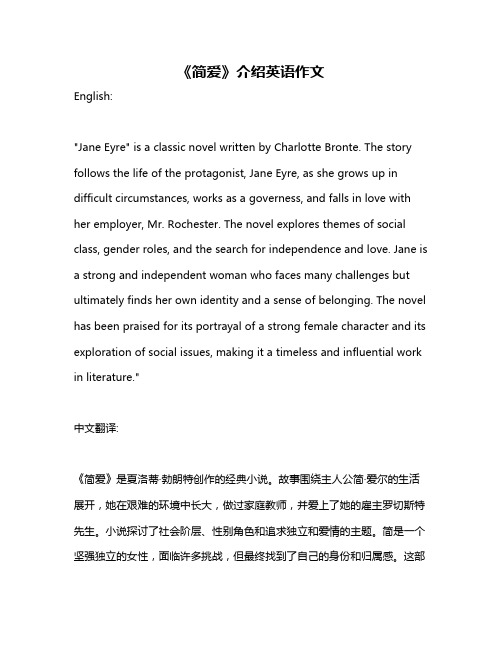
《简爱》介绍英语作文English:"Jane Eyre" is a classic novel written by Charlotte Bronte. The story follows the life of the protagonist, Jane Eyre, as she grows up in difficult circumstances, works as a governess, and falls in love with her employer, Mr. Rochester. The novel explores themes of social class, gender roles, and the search for independence and love. Jane is a strong and independent woman who faces many challenges but ultimately finds her own identity and a sense of belonging. The novel has been praised for its portrayal of a strong female character and its exploration of social issues, making it a timeless and influential work in literature."中文翻译:《简爱》是夏洛蒂·勃朗特创作的经典小说。
故事围绕主人公简·爱尔的生活展开,她在艰难的环境中长大,做过家庭教师,并爱上了她的雇主罗切斯特先生。
小说探讨了社会阶层、性别角色和追求独立和爱情的主题。
简是一个坚强独立的女性,面临许多挑战,但最终找到了自己的身份和归属感。
简爱英文简介10篇
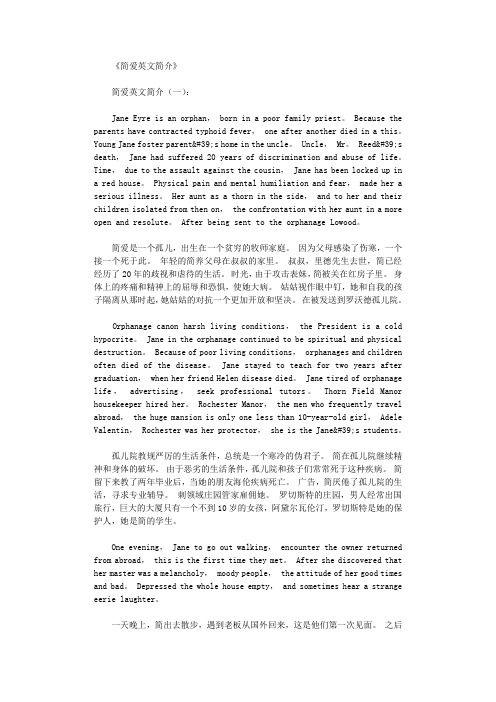
《简爱英文简介》简爱英文简介(一):Jane Eyre is an orphan, born in a poor family priest。
Because the parents have contracted typhoid fever, one after another died in a this。
Young Jane foster parent's home in the uncle。
Uncle, Mr。
Reed's death, Jane had suffered 20 years of discrimination and abuse of life。
Time, due to the assault against the cousin, Jane has been locked up in a red house。
Physical pain and mental humiliation and fear, made her a serious illness。
Her aunt as a thorn in the side, and to her and their children isolated from then on, the confrontation with her aunt in a more open and resolute。
After being sent to the orphanage Lowood。
简爱是一个孤儿,出生在一个贫穷的牧师家庭。
因为父母感染了伤寒,一个接一个死于此。
年轻的简养父母在叔叔的家里。
叔叔,里德先生去世,简已经经历了20年的歧视和虐待的生活。
时光,由于攻击表妹,简被关在红房子里。
身体上的疼痛和精神上的屈辱和恐惧,使她大病。
姑姑视作眼中钉,她和自我的孩子隔离从那时起,她姑姑的对抗一个更加开放和坚决。
- 1、下载文档前请自行甄别文档内容的完整性,平台不提供额外的编辑、内容补充、找答案等附加服务。
- 2、"仅部分预览"的文档,不可在线预览部分如存在完整性等问题,可反馈申请退款(可完整预览的文档不适用该条件!)。
- 3、如文档侵犯您的权益,请联系客服反馈,我们会尽快为您处理(人工客服工作时间:9:00-18:30)。
After a serious typhoid fever epidemic occurs simultaneously with Helen's death, the conditions in Lowood improve and Jane slowly finds her place in the institution, eventually becoming a teacher. When Miss Temple marries and moves away, Jane decides to change careers. She is desperate to see the world beyond Lowood and puts out an advertisement in the local paper, soon securing a position as governess in Thornfield Has very quiet with Jane teaching a young French girl, Adèle, and spending time with the old housekeeper, Mrs. Fairfax. But everything changes when the owner of the manor—brooding, Byronic, fiery Edward Rochester—arrives. Though on rough footing at first, he and Jane slowly become acquainted with and grow to respect each other. Mr. Rochester creates an elaborate set-up by seemingly courting a proud local beauty named Miss Blanche Ingram until Jane cannot bear it any longer. Mr. Rochester then admits that his courtship of Miss Ingram was a ruse to arouse Jane's jealousy and that it is she whom he truly loves. His feelings are returned, and they become engaged despite their differences in social status, age, and experience. Jane is young and innocent at nineteen years old, while Rochester is nearly forty—worldly, and thoroughly disillusioned with life and religion. Jane is determined to stay modest, plain, and virtuous, and Rochester is almost equally determined to offer her expensive presents and finery. The former has the moral high ground, though, and the weeks before the wedding are spent mostly as she wishes.
这是简爱的简介,供你参考,尽量用自己的话改一改。
Jane Eyre, is a poor orphan with a joyless life as a child in the opening chapters. Her wealthy aunt, the widowed Mrs. Reed, is bound by a deathbed promise to her husband to raise his orphaned niece, Jane. However, she and her children are unkind to Jane, never failing to emphasize how she is below them. Jane's plain, intelligent, and passionate nature, combined with her occasional "visions" or vivid dreams, certainly do not help to secure her relatives' affections.
When tensions escalate, Jane is sent to Lowood, a boarding school run by the inhumane Mr. Brocklehurst. She is soon branded a liar, which hurts her even more than malnutrition and cold, but Miss Temple, the teacher Jane admires, later clears her of these charges. She also finds her only friend in Helen Burns, who is very learned and intelligent, has a patient and philosophical mind, and believes firmly in God. Helen is often singled out for punishment by a teacher, Miss Scatcherd, who claims she is a bad child because she is disorganized, incompetent, and often late. Helen accepts these faults, and teaches Jane to accept discipline in order to improve her fiery temper and character. While Jane responds to the injustices of the world with a barely contained burning temper, Helen accepts earthly sufferings, including her own premature death from consumption (now known as tuberculosis), with calmness and a martyr-like attitude.
